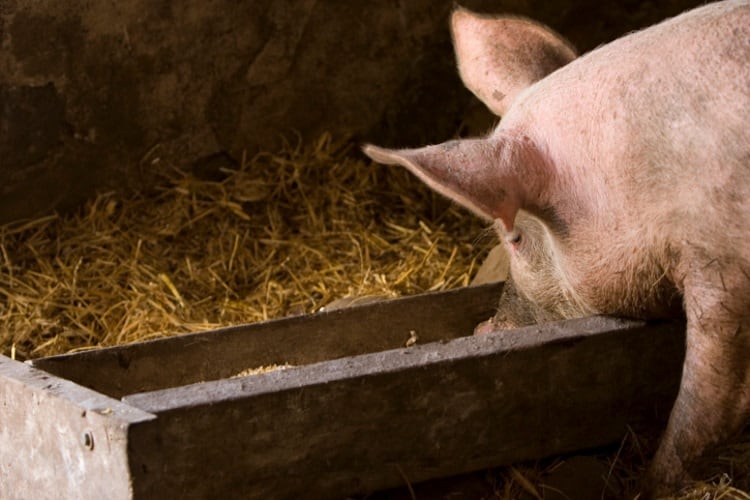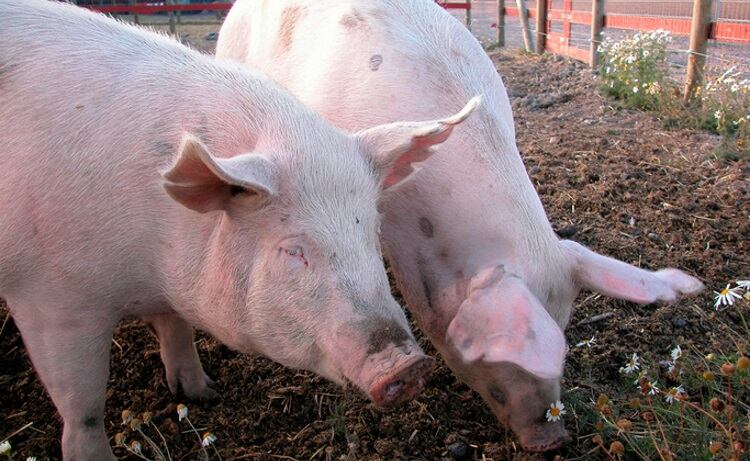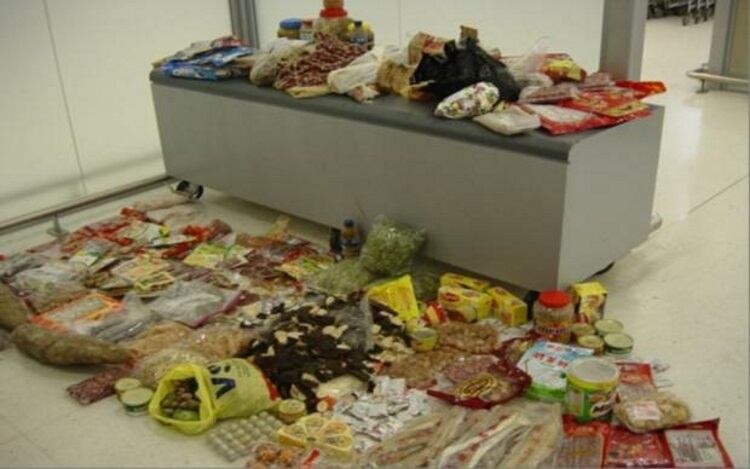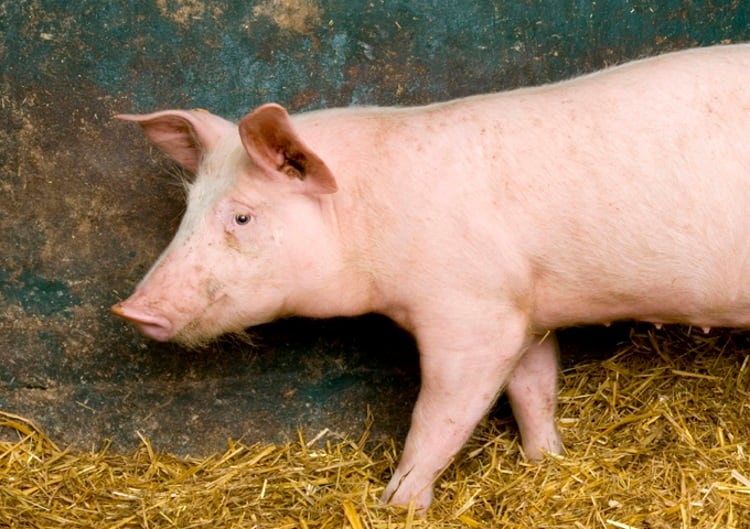Aimed at anyone who has the potential to introduce ASF to the UK, it includes a poster campaign, which will be introduced to UK airports and ports throughout the summer, to raise awareness of the disease and the risks of bringing back contaminated products.
It warns that one of the main ways that the disease can reach UK borders is by travellers bringing contaminated pork products with them back from infected regions. Earlier this month, meat containing ASF DNA fragments was confiscated at a Northern Irish airport.
Other ways that ASF could hit the UK include pig keepers feeding catering waste, kitchen scraps or pork products to their animals despite it being illegal to do so; travellers with contaminated clothing, footwear or equipment coming into contact with domestic pigs; and contaminated vehicles or equipment coming into contact with commercial pig premises.
The disease has already hit Asia badly, with an estimated four million pigs culled in the region. In Europe, ASF has spread to ten different countries, most recently Slovakia, leading to the culling of more than 800,000 pigs.
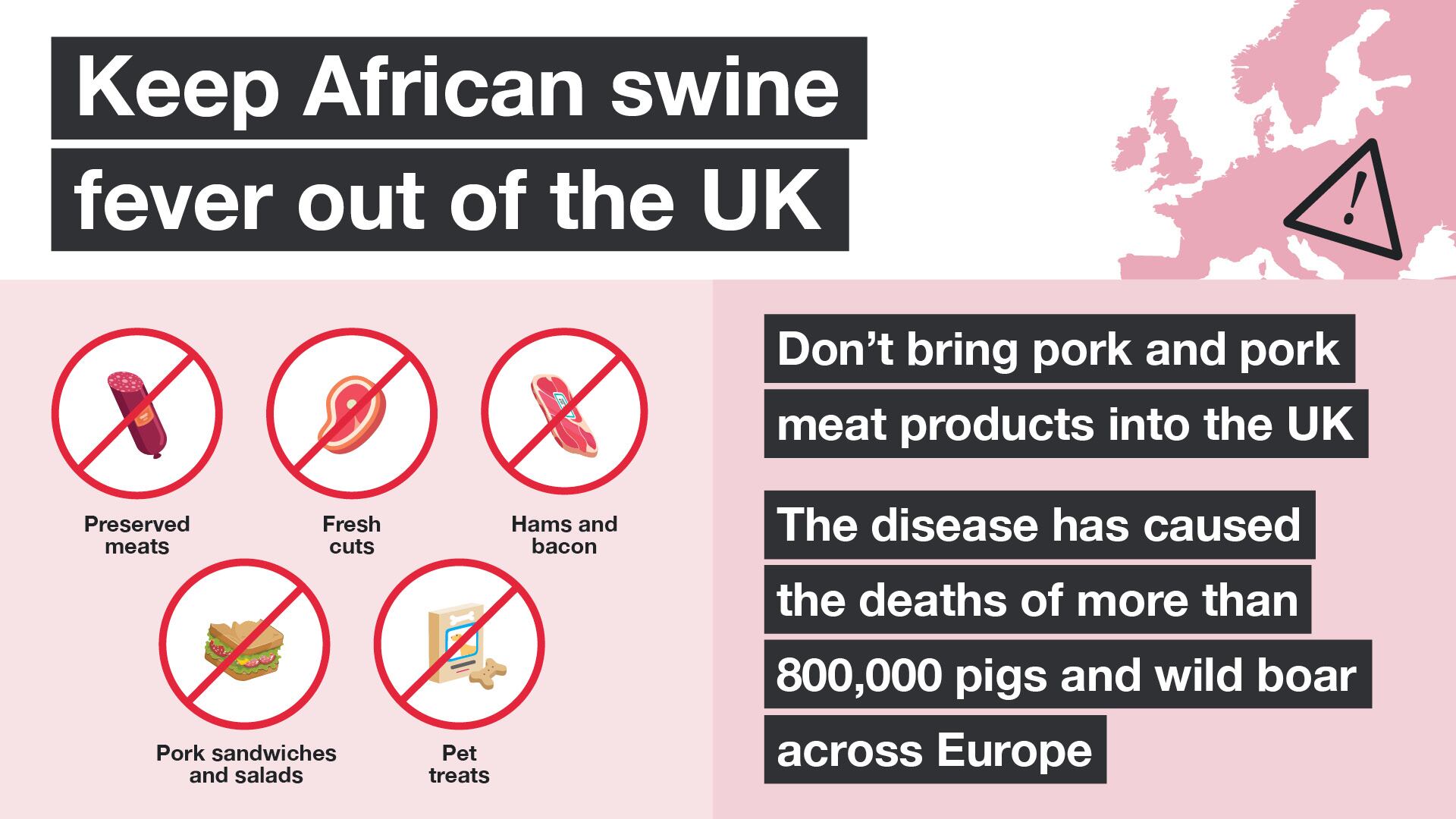
The UK’s chief veterinary officer Christine Middlemiss welcomed the campaign. “Keeping African Sswine Fever out of the UK is one of my top priorities. As we have seen around the world, its impact on pig farmers and the wider pork industry has been devastating.
“The virus survives incredibly well in pork meat and can survive for months in smoked, dried and cured meats and likely years in frozen meat. That is why it is crucial that anyone travelling from affected regions takes this advice seriously in order to ensure that there is no spread of the disease to animals in the UK.”
Minister for Biosecurity Lord Gardiner added: “While there has never been an outbreak of African swine fever in the UK, we are not complacent and already have robust measures in place to protect against animal disease outbreaks.
“This poster campaign at UK airports and ports adds to the strict control measures we have put in place to ensure that no live pigs, wild boar or pork products from affected areas reach the UK.
“It is essential all tourists and holidaymakers do not bring to the UK any pork products to protect the UK’s high biosecurity.”
£90m impact
Earlier this year the Department for Environment Food & Rural Affairs (Defra) estimated that a ‘reasonable worst case scenario’ outbreak could cost the UK up to £90m at 2019 prices. This includes lost value of animals from culling, movement bans and trade restrictions (£85m) and government costs for disease control activities (£5m).
However, the National Pig Association (NPA) believes the government’s estimate is conservative. NPA chief executive Zoe Davis said: “The government has estimated that a ‘reasonable worst-case scenario’ ASF outbreak could cost the country £90m. We believe the figure would be much higher and that is why we need to mobilise every available resource and effort to help prevent such a catastrophe.
“The NPA is delighted that Defra and UK Border Force are launching this campaign,” she added. “We have always stressed that the biggest threat to our pig herd is from products coming in from affected countries, so this is an important step to help keep ASF from entering our country.”
UK pig industry
A 2019 Pig Health and Welfare Council report estimated that approximately 6,900 people work on England’s specialist pig farms, with more working on non-specialist farms that have pigs.
Speaking to Global Meat News, the NPA’s senior policy adviser Rebecca Veale explained the cost of ASF to the UK pork industry from both a domestic and export point of view.
“The cost to industry is likely to be higher [than £90m] but very difficult to estimate because of the number of variables – for instance if ASF becomes embedded in pigs and/or wild boar and exports are stopped for a long time, the impact of movement restrictions longer term, the cost of secondary cleansing and disinfection (a cost picked up by the producer) is bespoke to each unit.
“Also the number of cases and the area that they may cover would be hugely influential; zones are put in place around a holding with ASF (3km and 10km but can be bigger), there are movement restrictions and requirements within these zones and therefore the size of them and units/processing facilities/feed mills etc., that are in them can have a huge impact on the disruption and therefore cost of an outbreak.”
Export risk
She said that once ASF is found in the UK, all pork exports will grind to a halt.
“From the moment we declare ASF we will lose all export markets immediately (currently worth approx. £490m per annum, including £80m to China), these will not be regained until we can prove freedom from disease. The markets for some parts of the carcase are only in exports and as such we would not just lose the export value but the carcase balance would be disrupted.
“As we have a rapidly growing wild boar population in the UK obtaining disease freedom may be difficult. Furthermore as we may not be part of the EU when this happens, we will have no established agreement in place such as regionalisation to be able to still export from areas unaffected by ASF.
“In terms of disruption for the domestic market, strict zones would be put in place to stop the certain movements of pigs, feed, bedding etc. to reduce the risk of spread. This would have a huge impact on the whole pork supply chain in the UK.”
Veale said the NPA considers the risk of ASF reaching the UK to be “very high”. “Some scientists will tell you it’s not if but when, given the speed at which ASF has spread across the EU and the movement of people and illegally imported product we consider the risk to be very high (despite Defra’s risk level being medium currently).
“All we can do as an industry is ensure our own biosecurity standards are as high as possible whilst working with government to raise awareness amongst travellers and increase border control. Wild boar numbers are high in parts of the country, without predators the numbers continue to rise and as such this population needs to be managed to reduce the risk of spread by wildlife if we were to have an outbreak.”
A Defra spokesman told Global Meat News that if ASF does reach the UK, there are “robust contingency plans in place to respond to outbreaks of disease such as ASF and these plans are regularly tested”.
Global Meat News will be hosting a webinar on African Swine Fever and its impact on the international meat market on 29 October. To get involved, contact Aline Henderson from our commercial team on aline.henderson@wrbm.com.

